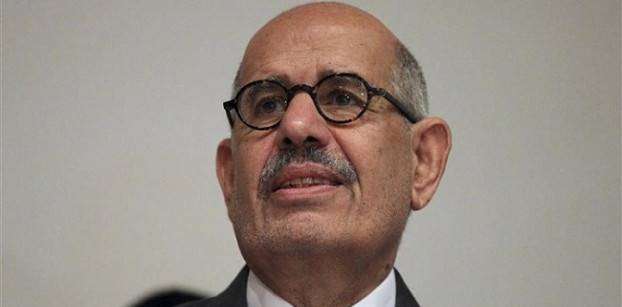Egypt's ElBaradei breaks silence on Rabaa dispersal in rare detailed statement

Egypt's former vice president Mohamed ELBaradei. Reuters
CAIRO, Nov 1 (Aswat Masriya) - Egypt's former vice-President for Foreign Affairs Mohamed ElBaradei published a statement on Tuesday denouncing media claims and clarifying his stance on the June 30 protests and developments that ensued in the aftermath.
After a three-year silence, the Nobel laureate recounted in 13 points the details of the events that occurred between July 14, 2013 when he assumed the post of Vice President for Foreign Affairs and August 14, 2013 when he resigned in light of the violent dispersal of the Rabaa al-Adaweya sit-in.
On June 30, mass protests erupted in Egypt demanding the ouster of former president Mohamed Mursi, who hails from the Muslim Brotherhood. Three days later, the military-led coalition, formed in the few unstable days of protests, ousted the elected president.
ElBaradei was part of the coalition responsible for drafting what came to be known as the "roadmap," consisting of several steps to complete the democratic transition phase including parliamentary and presidential elections, drafting a new constitution and national reconciliation.
In his statement, ElBaradei recalls the day of Mursi’s ouster saying that the Armed Forces called upon the coalition composed of various political figures to meet in an attempt to address the “volatile situation on the ground.”
"As the meeting began, I was surprised to know that the president had already been detained earlier that morning – without any prior knowledge by the coalition," ElBaradei said, "This effectively ruled out the option of holding a referendum for early presidential elections."
"The priority, for me, at the time became working to try to avoid civil strife and to keep the peace through a roadmap," ElBaradei added.
However, things took a different turn when the sit-ins organised by Mursi’s supporters in Rabaa al-Adaweya and Nahda Squares were violently dispersed by security forces on August 14.
ElBaradei opposed the dispersal, arguing that there were "almost agreed upon political solutions" on the table that could have served as an alternative to a "spiral of violence and division."
He later resigned from his post, prompting attacks launched by media figures against the decision.
ElBaradei laments the media attacks that persist to this day, mainly focusing on the timing of the dispersal and ElBaradei’s role in delaying the move, while maintaining that the dispersal could not have happened "peacefully."
The Nobel laureate frequently tweets his opinions and reactions to political and economic events. In mid-October, ElBaradei commented on the North Sinai attack that killed 12 security personnel, mourning the deaths and expressing his bewilderment regarding "hate and mutual violence."
He was then attacked by media figures for the comment.
In a series of successive tweets, ElBaradei talked about "fascist regimes" and "brainwashing," amid an avalanche of media reports and commentaries that ridiculed his most recent stance and other milestones in his career.
El Baradei headed the International Atomic Energy Agency (IAEA) from December 1997 until November 2009.
He was awarded the Nobel peace prize jointly with the IAEA "for their efforts to prevent nuclear energy from being used for military purposes and to ensure that nuclear energy for peaceful purposes is used in the safest possible way."









facebook comments